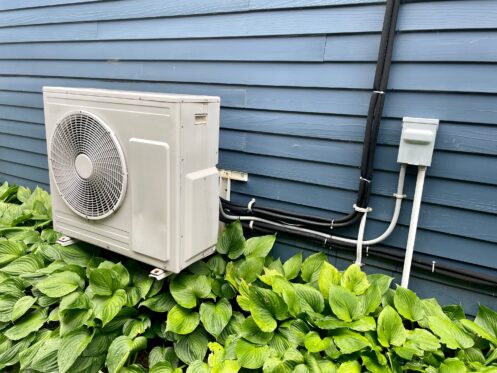At Bryant Heating, Cooling, Plumbing & Electric, we are a family-owned business that has served our community with cooling and heating services for over 80 years. We offer heating, cooling, electrical, and plumbing services in Kentucky, Indiana, Ohio, and beyond. And ever since heat pumps were invented, one of the most common questions people have about their heating and cooling system is, “What does a heat pump do?”
If you’ve ever wondered the same thing, you are not alone. Heat pumps are one of the most misunderstood HVAC systems, especially since they can provide both heating and cooling functions. If you have one, they are likely the most efficient component in your HVAC system. While you can have an HVAC system that functions without a heat pump, it usually requires more energy and results in higher costs each month.
If you have ever wanted to know what a heat pump is, what it does, and how it saves you money, you’ve come to the right place. This guide covers all of these questions and will help you better understand your HVAC system so that you can reap the benefits of owning a heat pump.
How an HVAC System Works
Your HVAC system is responsible for your home’s air quality and keeping you comfortable. It ventilates your home, moving fresh air in and stale air out and uses compressed refrigerant to keep your home at a comfortable temperature.
The heat pump is an energy-saving addition to your heating and cooling units. It aids in keeping your home warm in the winter and cool in the summer. Dual-mode heat pumps can function as the primary heat source, with your furnace as the secondary or backup heat source that aids the pump when needed. If you don’t live in an an area with frequent sub-zero temperatures during winter, you might not need a secondary heating source at all. But here in Ohio, Kentucky, and Indiana, it’s helpful to still have a furnace that can turn on just in case.
A traditional furnace heats air by passing it over heated coils. Normally, these coils are heated using electricity or gas. It is the heating of the coils that uses the most energy when heating your home.

A heat pump, on the other hand, uses electricity to create pressure in its compressors, generating heat. It uses significantly less energy to do so, making your home more comfortable and saving you money in the process. In addition to heating your home, it helps keep your place cool in the summer. It uses the same pressure to circulate and remove hot air, allowing it to cool the home more efficiently.
A Heat Pump and Your HVAC System
Heat pumps are crucial components of most modern heating and cooling systems. Their role is to move and circulate air, heating or cooling it as needed. Heat pumps work with your HVAC system to significantly improve its efficiency. They are an integral component of an energy-efficient and money-saving system.
Pressure Is the Key to Saving Thousands on Energy Costs
Heat pumps create pressure in one of its two compressors, one inside the home and one contained in your exterior unit. These two compressors are connected by coils filled with a gas refrigerant. The pressure causes the refrigerant in the coils to heat up and turn into liquid. The pressure forces the liquid and gas to move through the coiled tubing and into the opposite compressor.
There, it is cooled and returns to a gas state. The cool refrigerant moves back to the first compressor where it is once again heated and repeats the process. This creates a transfer of cold and hot air as it is circulated through your HVAC system continuously.
It takes much less energy for the compressors to create heat through pressure than it does to create heat in your furnace with electricity. This translates into reduced energy costs.
How Heat Pumps Work With Your Furnace
When the heat is turned on, the interior compressor creates the pressure that generates heat in the coils. The cool air outside is passed through the heat pump’s heated coils, warming it before being pumped into your home. On milder days, the heat pump can exclusively heat your home. However, when the temperatures outside drop too low for the heat pump to maintain a consistent and comfortable temperature, the furnace should kick in.
The warmed air that has passed through the heat pump coils is then passed over the electrically heated coils of the furnace. The thermostat will turn the furnace on and off, as needed, to maintain the temperature in your home.
If the heat pump becomes too cold, it will shut off and allow the furnace to do the work. This only happens when temperatures drop well below freezing. Your heating system is designed to automate this process to achieve the greatest efficiency.
Heat Pumps Also Improve the Efficiency of Air Conditioning
If you think a heat pump only helps heat your home, think again. It also plays an integral role in keeping your place cool and the air conditioning running efficiently in the summer.
When you switch the thermostat over to air conditioning for warm weather months, the heat pump reverses and instead of pumping hot air into your home, it moves hot air out of your home. The exterior compressor creates pressure to circulate the refrigerant, which is cooled by the exterior air.
As the refrigerant cools, it turns into a cold gas form that passes into the interior compressor. As the cooled gas moves through the interior compressor, air blows over the cooled coils.
As the gas moves back to the exterior compressor, it absorbs the heat from the air inside your home, turning it back into a hot liquid. This hot liquid is cooled again by the exterior air where the refrigerant turns back into a cold gas and the cycle repeats. On warmer days when the heat pump can’t cool your home enough, your thermostat will kick on the air conditioner as needed to maintain a constant temperature in your home.
Help the Environment and Save Money
If you don’t have a heat pump or have a less efficient older model, the cost of upgrading your old unit to a new efficient one will pay for itself. You may also qualify for energy rebates from the government that can help you save significantly on the cost of a new system. That makes right now the perfect time to make the switch.
Heat Pumps Demystified
Now that you know how a heat pump works and how it can save you money over its lifetime, you should take advantage of the cost savings and give Bryant Heating, Cooling, Plumbing & Electric a call. We can help you choose the right unit for your home and install your heat pump with expert care. We offer heating and cooling services, electrical work, and plumbing services to meet our customers’ needs. Whether you plan to update your heating and cooling system or you are renovating other parts of your home, we can help.



